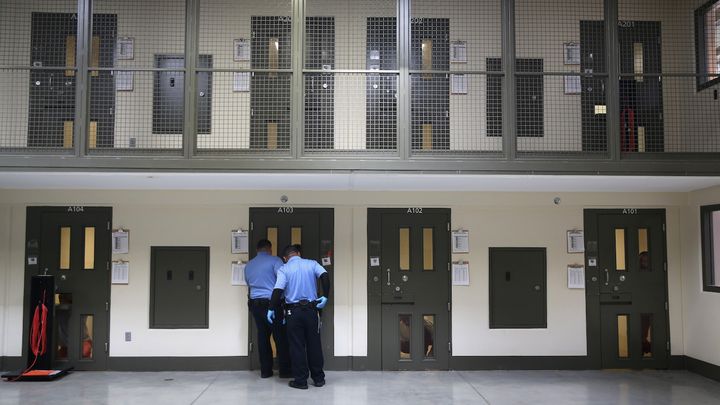The Congressional Black Caucus (CBC) says it wants to ban private prison companies that profit from mass incarceration, as do many criminal justice reformers. The caucus states on its website that banning private prisons is part of its agenda for the current session of Congress, and it has posted on Facebook recently in support of cities that end their contracts with private prison companies like CoreCivic and GEO Group, scoring hundreds of likes each time.
Despite its public statements, the caucus’ affiliated institute has financial ties to CoreCivic, a private prison company that activists say stands in opposition to reforming the criminal justice system.
In a lobbying contribution report filed with the House of Representatives, CoreCivic disclosed donating $25,000 in “honorary expenses” to the CBC-linked Congressional Black Caucus Institute (CBCI) on April 15, 2019. The filing lists CBCI chair Rep. Bennie Thompson (D-Miss.) and CBCI board members Jim Clyburn (D-S.C.) and Cedric Richmond (D-La.), the former chair of the CBC, as honorees. CoreCivic made a similar donation of $25,000 to CBCI in 2018.
CBCI is one of several affiliated entities that are legally distinct from the Congressional Black Caucus but share personnel and operate under the caucus’ brand and banner. CBCI says its mission is to “educate today’s voters and train tomorrow’s leaders,” and according to tax documents its main activities are candidate training, policy research, and an annual conference.
Another connected nonprofit, the Congressional Black Caucus Foundation, got $10,000 from the foundation of GEO Group in 2017, according to tax records.
It’s clear that the kind of prioritization on fundraising has outweighed the principles that these people should be governing under—one being that you can’t sell out our communities to the people who want them to be incarcerated, people who have benefited from the racial bias in the criminal justice system.
Scott Roberts, Senior Director of Criminal Justice Campaigns at Color of Change
Thompson is chairman of the House Committee on Homeland Security, and committee member Richmond chairs the Cybersecurity, Infrastructure Protection, and Innovation subcommittee. The committee oversees the Department of Homeland Security (DHS), which includes Immigration and Customs Enforcement (ICE), an agency that provides CoreCivic and fellow private prison giant GEO Group with hundreds of millions of dollars worth of contracts each year. ICE has given GEO Group nearly $1.9 billion worth of contracts and CoreCivic over $1.1 billion worth of contracts since 2008, according to usaspending.gov.
Earlier this year, Richmond was named as the first co-chair of the presidential campaign of former vice president Joe Biden, who sponsored the 1994 crime bill that drastically accelerated mass incarceration. Richmond’s office declined to answer questions about CBCI’s relationship with CoreCivic and referred Sludge to the CBCI. Clyburn’s office also declined to comment.
“Companies like CoreCivic are amongst the most committed entities in opposition to transforming our criminal justice system,” Scott Roberts, Senior Director of Criminal Justice Campaigns at racial justice organization Color of Change, told Sludge. “They are the most invested in maintaining the status quo that’s got us to being a country that is leading in the history of the world in incarcerating its own people.”
“It’s incredibly disappointing to know that any of the entities affiliated with the Congressional Black Caucus continue to take money from CoreCivic or any other private prison company, so there’s just no excuse for it,” Roberts said. “It’s unacceptable.”
CBCI did not return an email and a voicemail from Sludge, and the offices of Clyburn and Thompson did not respond to emails.
In its 2019 annual report CBCI’s 21st Century Council—a “membership-based business council” that is “comprised of government relations and policy professionals” and meets four times per year—lists top lobbyists from CoreCivic and GEO Group as “platinum members.”
CoreCivic’s Managing Director of Government Relations, Jeremy Wiley, is a platinum member of the 21st Century Council. Wiley is a registered lobbyist who most recently reported lobbying Congress on DHS funding regarding “issues pertaining to the construction and management of privately-operated prisons” and “ICE detention facilities,” as well as “issues related to Real Estate Investment Trusts.” Both CoreCivic and GEO Group converted into REITs in 2013 as part of their tax avoidance strategies.
Fellow 21st Century Council platinum member Emanuel Barr is National Director of Legislative and Community Affairs at GEO Group. On LinkedIn, Barr describes part of his job as “the negotiation of contracts to design and build reentry facilities on behalf of government accounts.”
CoreCivic did not respond to Sludge’s questions about why the company donated to CBCI, why a top lobbyist is a platinum member of the 21st Century Council, whether CoreCivic has directly impacted CBCI’s policy agenda, and about criticisms of large private prison companies making money from transitional programs.
Recidivism
“Reentry programs and reducing recidivism are 100 percent aligned with our business model,” said CoreCivic CEO Damon Hininger in 2014.
The CBCI 21st Century Council annual report for 2019 includes a section on reducing recidivism, or the likelihood that a previously incarcerated person will be reincarcerated.
The council’s policy recommendations specifically mentions government contractors, like CoreCivic, by promoting a new “‘pay for success’ performance-based model to align contractors with public policy objectives for reducing recidivism.” The CBCI plan “holds providers accountable for delivering measurable results, allows for ‘success’ payments if recidivism rates improve beyond a certain threshold, and administers penalties for unachieved goals.”
The 21st Century Council also recommends “policies that encourage companies to partner with prisons and provide inmates with vocational training in a variety of industries to help combat recidivism and address the skills gap.”
CoreCivic is earning increasingly large profits from its “Community” program meant to reduce recidivism, which encompasses residential reentry centers and non-residential services such as electronic monitoring. In 2018, the Community program had nearly $102 million in revenue, a 37% increase from the year before. CoreCivic offers vocational training at some of its detention facilities.
To keep those increasing profits coming, CoreCivic hires lobbyists to urge government officials to boost reentry programs. In this year’s second quarter, the company paid Jeffrey Miller, the former chief financial officer of the California Republican Party, to lobby on “issues related to prisoner reentry programs and facilities.” It paid Robert Russell and Gephardt Group associates to lobby Congress “in support of a range of government policies that will help former inmates successfully re-enter society and stay out of prison.”
Some criminal justice reform advocates have criticized major prison companies for profiting from the reentry space. The American Friends Service Committee wrote that these companies “out-compete smaller, community-based service providers for contracts,” “promote more restrictive options that incorporate a larger number of people,” and “promote expanded use of supervision and surveillance for low-risk populations.”
“The pursuit of profit undermines the movement’s goals of shrinking the size and scope of the criminal punishment system,” the 2016 report reads.
The American Civil Liberties Union noted that CoreCivic’s lobbying for “increased funding for inmate work programs” could lead to worker exploitation and unfair wages.
Meanwhile, In the Public Interest argues that private prisons increase recidivism.
‘Not the First Time This Issue Has Come Up’
In 2016, Color of Change campaigned to pressure then-presidential candidate Hillary Clinton and the Congressional Black Caucus’ political action committee to stop taking contributions from private prison companies and their lobbyists. Clinton and CBCPAC stopped accepting these donations, so the 2018 and 2019 CoreCivic contributions to the CBCI are disappointing to Roberts.
“We thought the attention that media reporting and our campaign brought to this issue, in particular on private prison contributions, was a wake up call, so it’s really disturbing to hear that another one of the entities is taking such large amounts from one of the private prison companies,” Roberts said.
After CBCPAC cut its ties with private prison-linked lobbyists in March 2016, chairman Gregory Meeks (D-N.Y.) told Politico that concerns over corporate influence are overblown and that its board members “represent themselves, not their companies or clients, and they support the PAC’s mission and want to give back to the community.”
Roberts told Sludge that he would be reaching out to members of the Congressional Black Caucus to make sure they’re aware of the contributions and to request that they try to stop CBC-affiliated organizations from taking more money from private prison companies.
“It’s clear that the kind of prioritization on fundraising has outweighed the principles that these people should be governing under—one being that you can’t sell out our communities to the people who want them to be incarcerated, people who have benefited from the racial bias in the criminal justice system,” Roberts said. “So, yeah, they absolutely should commit to not taking any more of their money and should return anything they have already taken.”
This article has been updated to include mention of a donation from the GEO Group Foundation to the CBC Foundation.
Related from Sludge:



